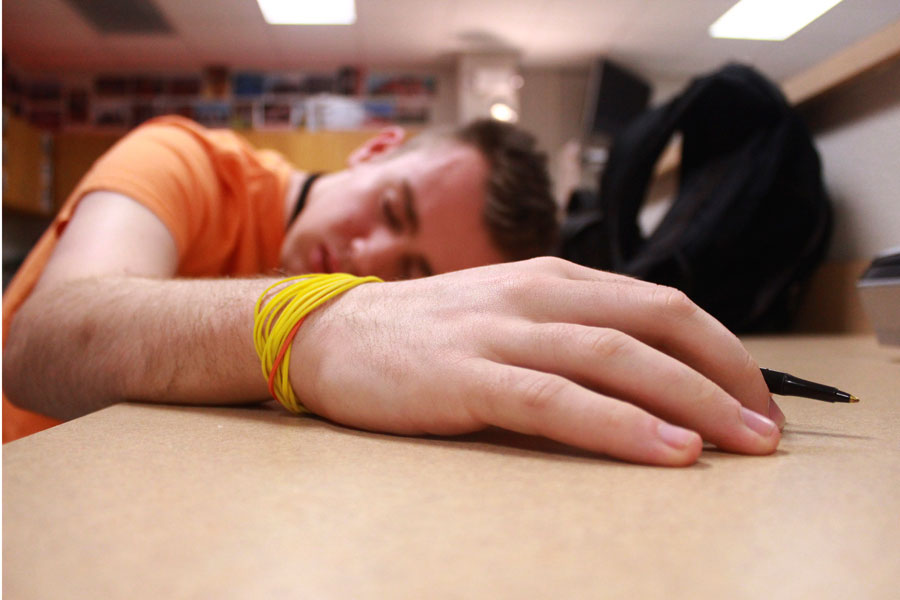Washing dishes for seven and a half hours really drains a guy. It’s almost midnight and senior Michael Peterson has just gotten home from his job at Mellow Mushroom. Unfortunately for Peterson, he can’t go to bed just yet. He has an essay due the next day in English, an essay he hasn’t even started. With class starting at 7:25 a.m., Peterson’s got a rough night ahead of him.
“It’s more stressful because there are more things that I have to accomplish within the already short amount of time,” Peterson said. “I wish I had more time to sleep. Sleep is good.”
With over 85 percent of high schools starting before 8:30 a.m., getting enough sleep is virtually impossible. Teenagers have a hard time falling asleep before 11:00 p.m., and with many students waking up as early as 5:00 a.m. to catch the bus, a shocking number of high schoolers aren’t getting a sufficient amount of sleep.
The American Academy of Pediatrics (AAP) has released a statement saying teenagers should receive between eight and a half and nine and a half hours of sleep per night. Currently, only 15 percent of high school students get this recommended amount of sleep, and it’s not all because of late-night Netflix binges.
“More rest is more beneficial to an individual’s alertness and ability to be educational in school,” Peterson said. “Sleep is proportionally related to the ability of things I do in school.”
Consequently, this chronic sleep deprivation has led to severe health issues, even being called a “public health crisis” by the director of sleep medicine at Children’s National Medical Center. The AAP reports that teenagers who don’t get enough sleep are at increased risk for depression, anxiety, obesity and diabetes, among other complications. Focus, endurance and memory, vital factors in academic success, are negatively affected.
“If school started later it would allow me to get more sleep in and be able to do more of the various activities I need to do,” Peterson said. “As of right now, that is not possible and time management is necessary for it to become more possible.”
But starting school later may not have as big an effect as proponents wish. Currently, students in earlier classes don’t necessarily perform worse than those in later classes who have had more of a chance to wake up. Take for example Coach Michael Keel’s AP U.S. History course, where grades are consistently better in first block than in later periods, though there is less participation.
[For more information, check out The Rider Online’s editorial, “School Day Should Start Later.”]
“These kids that I have this year first period do very well academically and they’re not very talkative people anyway,” Keel said. “They’re very succinct and the other kids are just more outgoing, and maybe it’s just when I have them, I’m not sure.”
On the contrary, Pre-AP Biology teacher Ms. Michelle Fagan has noticed better grades in her afternoon classes, but she doesn’t credit time as the biggest influence.
“One of the key things is that the early classes have a chance to visit with students in the later classes as the day goes on,” Fagan said. “If there’s a test or something like that, some of the ‘You better study this because it’s on the test’ or ‘Don’t forget that homework was due,’ a lot of that goes on.”
Ms. Amberly Walker’s English 3 students recently read a CNN editorial in favor of later school start times. Students then wrote about and discussed their personal opinions on the issue. Walker was surprised by their responses, with about 40 percent of the class preferring the present schedule.
“It wasn’t as lopsided as I thought it was going to be, where nobody wanted to start at 7:25 a.m.,” Walker said. “I was impressed by the amount of students that were like, ‘You know what? It’s something you gotta do. Get up early, get out of here early.’”
While recent news articles have shown an overwhelming amount of support for later start times, the benefits of a little extra sleep don’t come without a few snags. School transportation systems are carefully planned to maximize efficiency, and this change would mess with the system and increase costs. Since high school students would be picked up around the same time as students in lower grades, school districts would have to acquire more buses and drivers to accommodate everyone. A proposed solution to this problem is flipped start times, with younger students starting school earlier instead.
“It seems an easy decision, just start school later, what’s hard about that,” Walker said. “Well, it’s not as cut-and-dry as it seems.”
The effect on extracurriculars poses another problem. On one hand, students may perform better in both athletics and academics since they’re not suffering from sleep deprivation. On the other though, students who participate in after-school activities would either have to stay late into the evening or have their practice time reduced. Sports might have to compete for field and gym space, resulting in the loss of some programs.
“If we go to school until five o’clock at night and then you have practice, when are you getting out of here?” Keel said. “When are teachers and coaches gonna see their families?”
Furthermore, later start times do not guarantee that students will receive more rest. Precalculus teacher Dr. Stephan Shardy believes starting school later could potentially be counterproductive.
“I don’t believe, in my opinion, that a later start necessarily is going to make any difference,” Shardy said. “Students will still sleep in and come to school later and not be awake anyway.”
Despite his late shifts, Peterson agrees with Shardy’s hypothesis, feeling that a later start time would only change the norm.
“I would stay up later, but I would just be procrastinating,” Peterson said. “It would be entirely recreational, nothing would get done. I’m gonna complain regardless.”
With so many factors calling for consideration, the question of how to solve the teenage sleep crisis will continue to be hotly debated.
“Does schoolwork get sacrificed, does sleep get sacrificed?” Walker said. “There’s only so many things you can get done in a day, so I see this as an issue that is going to be an ongoing issue.”
For more information, check out The Rider Online’s editorial, “School Day Should Start Later.”





bob • Apr 6, 2015 at 4:00 am
fantastic
Abby Turner • Jan 9, 2015 at 8:31 am
I agree I think school should start later because no one gets 8 hours of sleep. most of us have chores or work and homework and don’t get finish until like 11 at least.
Sara Gerges • Jan 8, 2015 at 4:43 pm
It’s good that Peterson is learning how to manage his time now because it’s a very important skill to have in life. For example, when you get a job in the real world, you will still have to keep up with your family, do any hobbies you might have, go to the gym, etc.
Ava • Jan 8, 2015 at 8:58 am
It’s good student are being mature enough to admit that they believe starting school later might not help, instead of lying about their opinion against logic so they can sleep in. Maybe we get out earlier instead, so as to have more time to get things done and go to sleep quicker.